|
Max Jacobs (Charles Lane) is at the end of his tether. The director of the latest play by revered playwright Oscar Jaffe (John Barrymore), he is struggling to tease an even remotely convincing performance from his leading lady, Mildred Plotka (Carole Lombard), a former fashion model who has been personally selected by Jaffe to play the lead in a play that he is personally supervising the production of. When Max complains to Jaffe’s two assistants, accountant Oliver Webb (Walter Connolly) and perennially tipsy publicity agent, Owen O'Malley (Roscoe Karns), they give Oscar a call and he comes storming in to take control of the rehearsal, relentlessly drilling Mildred – whose name he has made the unilateral decision to change to Lily Garland – to the point of despair. When she breaks down and announces her intention to leave, her display of raw emotion lights a spark in Oscar, who has one final trick up his sleeve to provoke the convincing scream he has been pressing Lily all night to produce. Lily is startled by his actions but Oscar is overjoyed with the result and is convionced that success is now within their grasp.
A few weeks later the cast has just completed the play's opening night performance and the triumphant Lily is being showered with bouquets, while a serious-looking Oscar watches on from the shadows. When he enters Lily’s dressing room a short while later, all she wants to know is whether she has lived up to his expectations. He responds by telling her that he has come to pay his respects to a great actress and kneeling at her feet, then apologises for his previous behaviour and reveals that she has had a golden star nailed to her dressing room door. He clearly means what he says and it appears to be coming from the heart, at least until he asks if he might kiss his protégée goodbye and take his leave, whereupon Lily breaks down and begs him to stay. As he embraces Lily and quietly closes the door with his foot, Oscar’s expression is that of a man whose every move made since he first laid eyes on this former underwear model was part of a plan to get them to this point. It may be 1934, but there can be few who do not guess what then occurs between the two behind that closed door.
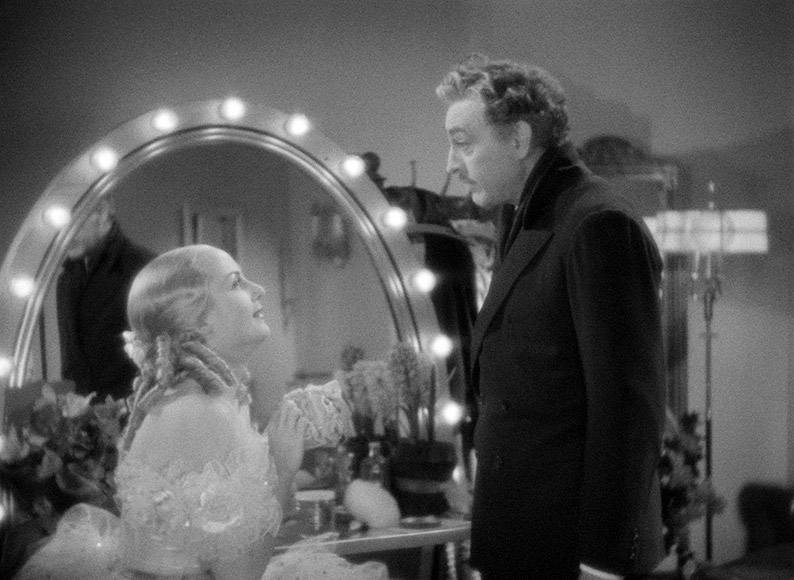
Three years and two more hugely successful collaborations later and Lily is sick of the possessive Oscar’s relentless attempts to control every aspect of her life and is agitatedly telling her cheerless but loyal maid Sadie (Dale Fuller) and the still half-drunk Owen that she’s damned well going out to socialise with whomever she pleases. When Oscar walks in wearing an expression as sombre as his clothing, Lily berates him for his past three years of controlling behaviour, to which Oscar calmly responds by threatening throw himself out of the apartment window. By then all-too familiar with Oscar's overdramatics, Lily openly mocks him, but in the ensuing and near-physical argument that follows the two somehow manage to patch things up. The next morning, Oscar appears to be a changed man, fully aware that he has been too possessive and now happy for Lily to come and go as she pleases with no questions asked. A delighted Lily thus heads off to the theatre alone, but just seconds after she has left the apartment, Oscar is arranging to have her phone line tapped and her every move watched. When the unaware Oliver inadvertently exposes what Oscar has been up to, it’s the final straw for Lily and she boards a train to Hollywood, and while her career there soars, Oscar’s takes a nose-dive. Facing the loss of his theatre and on the run from debt collectors, he and his assistants board the famed Twentieth Century Limited express train, and who should get on at the next stop but Lily, accompanied by Sadie and her dullard of a new boyfriend, George (Ralph Forbes).
Along with Frank Capra’s It Happened One Night of the same year, Twentieth Century is generally credited with giving birth to the screwball comedy, a subgenre whose penchant for sharp, quickfire dialogue hit a dizzying peak in 1940 with His Girl Friday, which in common with Twentieth Century was also written by Ben Hecht and Charles MacArthur and directed by Howard Hawks. Almost all of the subgenre’s codes and conventions are established here, and while Twentieth Century may spend more time on its build-up than His Girl Friday and lack that film's trademark overlapping dialogue, the two still have a surprising amount in common. Both revolve around a manipulative man who schemes to convince a talented and strong-willed woman with whom he was previously romantically involved to work for him again, something she has no desire to do. In both cases, the woman has since found herself an altogether less interesting wet blanket of a new beau and becomes the target of deceitful schemes hatched by her former partner to trick her back into a life she has theoretically put behind her. This also at one point results in the man and woman getting enthusiastically caught up in the thrill of a calling in which they were once a successful team, only for the woman to then lose her rag at the man when she realises that he’s the same manipulative swine she left the job to get away from in the first place.
The time taken on what is effectively the build-up aside, what immediately differentiates Twentieth Century from His Girl Friday is the spectacular theatricality of its lead performance, with John Barrymore playing Oscar Jaffe to the gallery and somewhere beyond. And it’s a glorious thing. While in most films such a performance would prompt wincing accusations of ham, it’s pitch-perfect for a man who appears to have spent his entire adult life playing a character born of his own inflated ego. It’s one he uses to present his talent to others as genius, to cajole those he works with into bending to his will, and to frightening actors into giving the performance he demands of them, and he’s been doing it for so long now that he is unable to divorce this bombastic creation from who he really is. Yet the notion that he is playing a role is doubtless one he would recoil from – after disguising himself as a Samuel Clemens-esque southerner to avoid his creditors and sneak aboard the Twentieth Century, he contemptuously remarks to his companions, “I never thought I should sink so low as to become an actor.”
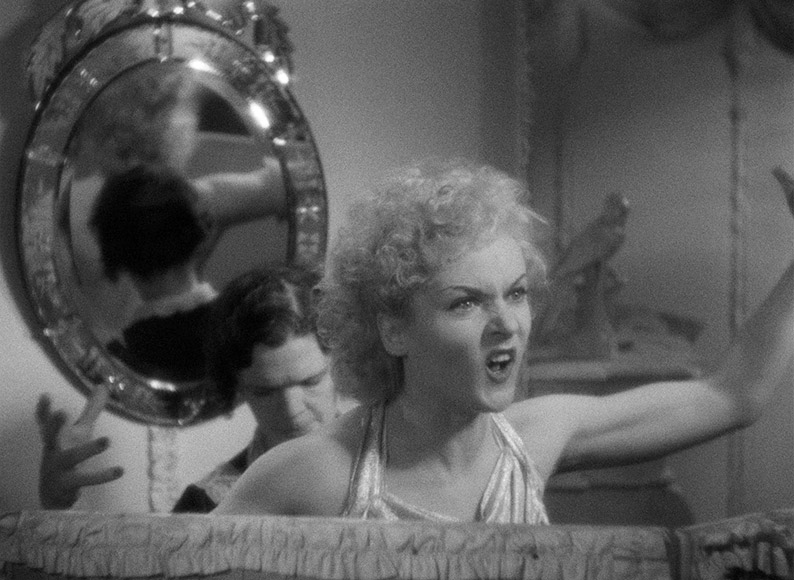
In her breakout role as Lily, Carole Lombard proves the perfect foil for Oscar, and not only gives Barrymore a serious run for his money, in terms of her character's journey over the course of the film she comes close to besting him. Introduced as a nervous and eager-to-please former fashion model with acting ambitions, she is transformed by success and the impossible restrictions placed on her social life into an energetic ball of frustration and anger, only to later reappear as an pampered movie star diva, a self-created image that is every bit as artificial and ego-driven as that of the man she walked out on. Both Oscar and Lily are hugely entertaining in the interactions with various third parties, but it’s when they get together that the sparks really fly, like the two key ingredients of a chemical reaction that may produce entertainingly explosive results but which runs the constant risk of burn-out or implosion. Yet it’s in these moments that the two seem most alive, and you can’t help thinking that if they could put their bickering aside, and if Oscar wasn't such a jealously controlling dick, they could be a theatrical force to be reckoned with.
As so often with Hawks, many of the supporting roles are every bit as memorable as the leads, in part because they have been so savvily cast. Walter Connolly and Roscoe Karns are a constant delight as Oscar’s assistants, Oliver and Owen (I’m wondering if there’s a gag that I’m missing that revolves around the fact that all three names start with the letter O), with Karns in particular having fun with Owen’s constant state of mild inebriation, which he never overplays but works comically into his vocal delivery and physical movement. Adding a seemingly random element to the train journey but later woven into the central narrative, meanwhile, is Etienne Girardot as the politely potty Matthew J. Clark, who is driving the Twentieth Century train staff to distraction by slapping large ‘Repent’ stickers on any available surface, including conductors’ uniforms and Oliver’s hat.
Hawks observes the action primarily wide and mid shot, reserving close-ups for plot point clarity and emotional peaks but still selecting has angles for maximum dramatic and comic effect. His key priority was clearly his performers, and by giving them room to manoeuvre he is able to more effectively showcase their comic physicality, a technique also employed to shoot dance sequences in classic-era Hollywood musicals. Where Hawks and his editor Gene Havlick (who, it should be noted, also edited It Happened One Night and His Girl Friday) do come into their own is in the time transitions used to almost invisibly move the story forward a few years at a time without the need for explanatory text or reflective narration. The most perfectly executed of these occurs immediately after Oscar has worked Lily to near-exhaustion and finally drawn an authentic scream from her by stabbing her sharply in her rear end with a pin. As she recoils in shock and pain and Oscar and the distantly seated Oliver applaud her efforts (superbly framed in the same shot by cinematographer Joseph August), the film quickly wipes to the louder and even more enthusiastic applause of the audience on opening night, telling us all we need to know about what occurred between these two pivotal moments in Lily's career (she even keeps and treasures the pin as a career-launching memento). The rehearsal scene also contains a great visual gag that is made to work almost solely through camera placement and the timing of an edit. As a frustrated Oscar tries to guide Lily’s movements by drawing chalk lines on the stage floor for her to walk along, he pauses for a second to consider his next move and a time-pass wipe moves us to a higher angle, revealing a densely confusing web of chalk lines that even a psychic with an eidetic memory would have no hope of following. It’s one of many times in the film that I laugh out loud on every viewing.
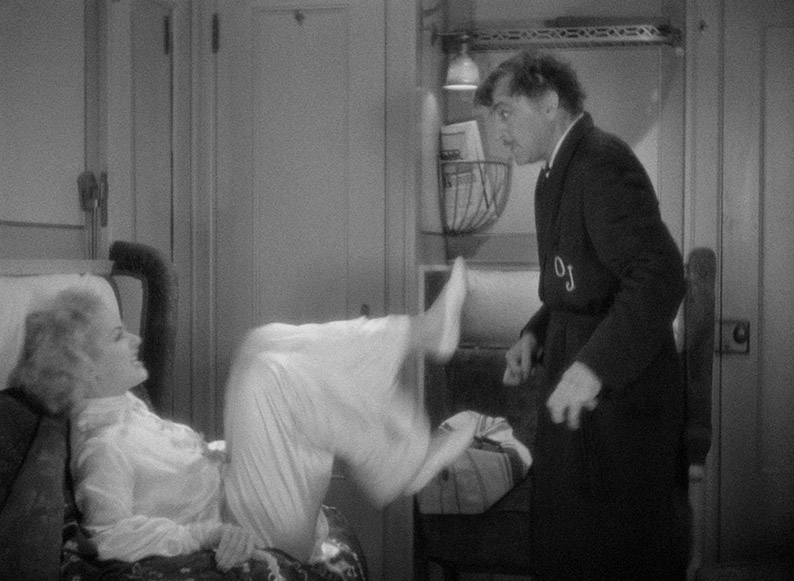
As you would expect from Hecht and MacArthur, the dialogue is densely packed and often priceless, and the authors seem to have had particular fun dreaming up simple but unexpectedly amusing insults, which Barrymore and Lombard deliver with relish. A personal favourite comes when when Max confronts Oscar after he randomly picks a girl from the supporting cast to promote to a lead role that was meant for the now departed Lily, and Oscar responds with a seething, “You amoeba…” This proves to be the first step in a build-up to his solemnly delivered catch phrase, “I close the iron door on you,” which is always accompanied by a slow and dramatic hand gesture of dismissive finality. And while the lion’s share of the memorable lines, of which there are many, are delivered by the two leads, members of the supporting cast also have their moments. When a dismayed Oscar learns that Lily has departed for Hollywood and says in a dramatic half-swoon, “Oliver! Did you hear that? She’s left me!” Oliver instantly responds in all sincerity with, “Say the word, OJ, and I’ll kill myself.” And Hecht and MacArthur are not above dipping their toes into the comically surreal, as when Lily quickly recovers from a minor meltdown with the assurance to George, “It so happens I’m calm as a fish.”
Twentieth Century is the sort of film that about which it would be easy to write enough to fill a small book. It’s wonderfully written, has a dynamite cast in comedic overdrive, is smartly directed, and it moves at the speed of the train on which it is primarily set. It’s a film I enjoyed immensely the first time I saw many years ago and it just seems to have gotten better and funnier with each subsequent viewing. See it for Barrymore and Lombard alone and you’ll be getting your money’s worth and then some, but there’s so much more to relish here, and the sense that everyone is pulling together in perfect harmony gives the film a sense of visual and aural cohesion that is a hallmark of the very best Hollywood work of the era. Yet for all its lampooning, the film’s portrayal of the workings of theatre and the figures within it is not as far from reality as surface impressions might mislead you to believe. Oscar Jaffe was apparently based in no small part on successful but widely despised theatrical producer Jed Harris (someone Laurence Olivier once described as "the most loathsome man I'd ever met"), and Lily’s journey from wannabe actress to over-pampered film star is one you could throw a stick and hit just about any time in Hollywood's long and bumpy history. The exhausting methods employed by Oscar to draw a performance out of Lily are similar to stories told by many an actor working in the film or theatre of the day, and indeed the decades that followed. And if his trick of stabbing Lilly with a pin to prompt the reaction he needed seems a bit of a stretch, it’s worth remembering that almost 40 years later, William Friedkin finally got the authentic look of distress he required from first-time film actor William O'Malley at the climax of The Exorcist by slapping him violently around the face immediately prior to running the camera. How times change.
Sourced from a Sony 4K remaster supervised by Rita Belda, the 1080p transfer here presents the film in its original 1.37:1 Academy ratio, and the results, while not quite as razor-sharp as a select few restorations of films from this period, is still very pleasing. The contrast has been evenly graded, nailing the black levels but not at the expense of picture information in darker areas, and the image detail is often very clearly defined, something particularly visible on the texture of clothing and the text on newspapers or posters. In common with a fair few films from the era, the image feels a tad less crisp on some wider shots, but is never what I’d describe as soft. Grain is clearly visible but not distractingly so, and there is next to no sign of damage or wear. Very nice.
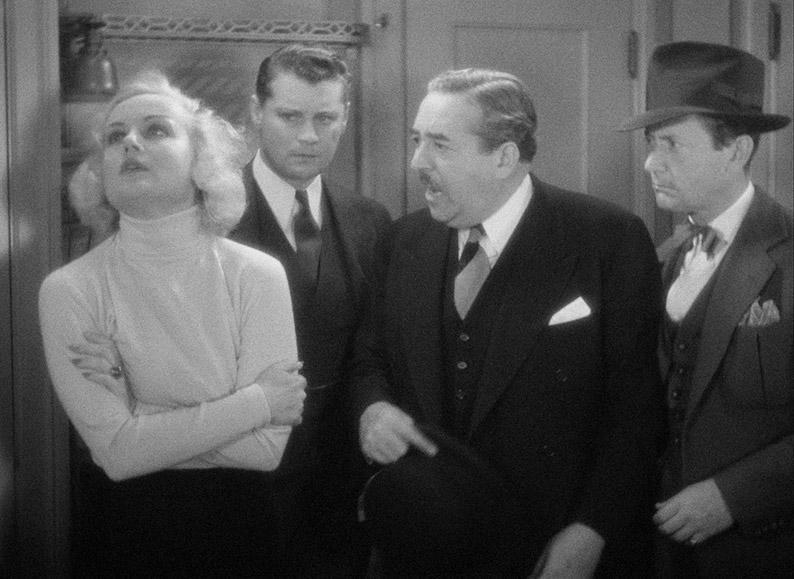
The Linear PCM 1.0 mono soundtrack shows its age in its limited dynamic range and complete lack of bass, none of which is in any way unusual for a film made so early in the era of synchronised sound. Dialogue, however, is always clear, and as well as there being no evidence of damage there is also, more surprisingly, little in the way of background fluff or hiss.
Optional English subtitles for the deaf and hearing impaired are available.
Audio Commentary with Farran Smith Nehme
It’s clearly evident from the moment film critic and writer Farran Smith Nehme starts talking about Twentieth Century that it’s a film she adores, a viewpoint she is fully able to justify over the course of this busy and informative commentary. There’s plenty of detail not just on the lead actors and director Howard Hawks, but also some of the key supporting players, cinematographer Joseph August, famed Columbia studio boss Harry Cohn, and the real-life theatrical figures on whom Oscar Jaffe was based. We get information on the origins of the film, Carole Lombard’s costumes, the subsequent Broadway musical adaptation, concerns the Hays office had about the references to the Passion Play and the choice of body part that was stabbed by the pin that changes Lily’s career, contemporary critical response, and much more. A useful and engaging companion to the film.
Stars in Her Eyes: Lucy Bolton on Carole Lombard (16:17)
Film historian Lucy Bolton Looks back at the career of Carole Lombard, from her discovery at the age of 12 to her time as one of Max Sennett’s Bathing Beauties, her subsequent work with Pathé and her seven-year contract with Paramount, where she was loaned out to Columbia for her career-changing role in Twentieth Century. Given the fight for equal pay and standing that women in many industries are still facing, it’s rather pleasing to learn that in 1937 Lombard was the highest paid actor in Hollywood. This is all the more inspiring when you learn that her earlier contract with Fox was cancelled after she was facially injured in a serious road accident, a scar from which remained even after pioneering plastic surgery treatment. In common with Farran Smith Nehme above, Bolton elects not to discuss Lombard’s tragically premature death at the age of 33 in detail, though Smith does recommend a book on the subject for those who are interested in finding out more.
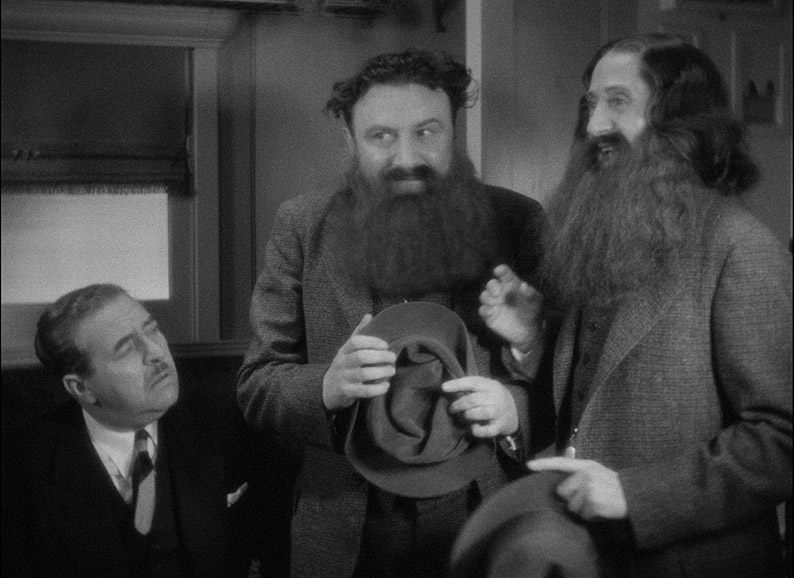
Peter Bogdanovich Recommends ‘Twentieth Century’ (5:10)
The 4:3 aspect ratio and SD tape aesthetic of this introduction by filmmaker Peter Bogdanovich suggests that it was recorded some years ago to accompany a TV screening of Twentieth Century, or, at a pinch, to be included as an extra on an earlier, pre-restoration DVD release. The film is one of Bogdanovich’s personal favourites and he’s every bit as enthusiastic about it as the other contributors to this release. He’s the third (well, technically the first since this was recorded some years ago) to tell a the same anecdote about how Hawks took Lombard aside and convinced her to loosen up and be herself, but is the first to reveal that the whole film was shot in just three weeks.
Super 8 Version (20:10)
An 8mm version of the film created for home viewing that is so cut down from the original that it plays like an extended trailer, albeit one that reveals the ending. A narrator fills in the gaps in the story that such compression creates, but the flow of the original is decimated here, with Hawks’ time transitions and the above-mention angle-change gag all lost in the re-edit, as is Oscar’s every utterance of his signature “I close the iron door” line.
The Campbell Playhouse: ‘Twentieth Century’ (1939) (55:48)
Originally broadcast on 24 March, 1939, this Campbell’s Soup sponsored radio production of Twentieth Century stars Orson Welles as Oscar Jaffe and Elissa Landi as Lily, with Sam Levene and Ray Collins in support. Structurally, it differs from the film by devoting the opening ten minutes to Lily’s first audition with Oscar before skipping through the next few years to the train on which the original stage play was entirely set. Welles has a ball playing it up as Oscar Jaffe, but the whole thing feels a lot less cohesive than the film adaptation, whose verbal comedy was complimented by its visuals and the physicality of the performers. The reason that Oscar is on the train in this version also differs, as here he is fully aware that Lily is on board from the start and has deliberately booked the adjacent room, which strips the story of an element that for me worked better as a chance encounter. Of particular note is that the music for the show was arranged by a certain Bernard Herrmann.
Austin Film Society Trailer (0:52)
A nicely edited trailer with modern-looking credits, prepared for an Austin Film Society presentation of the 4K restoration, which I’m guessing is the one from which the transfer on this disc was drawn.
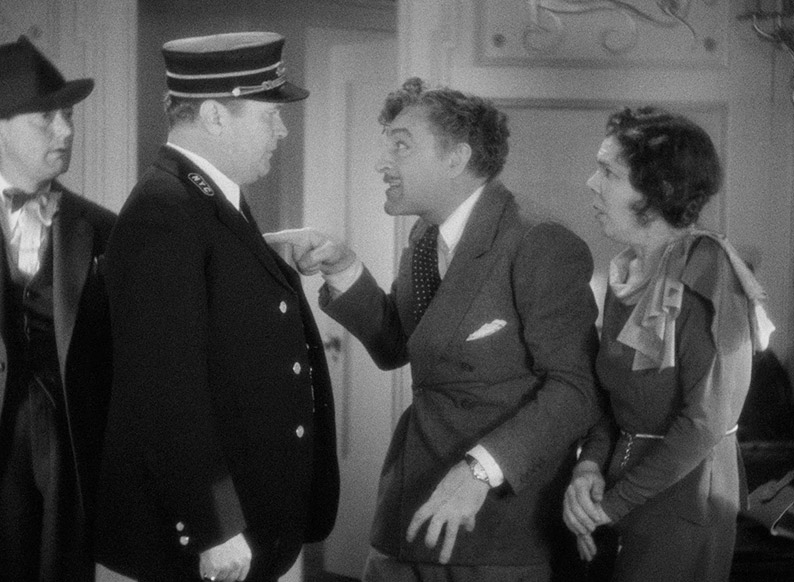
Image Gallery
45 screens of promotional and behind-the-scenes photos, dayglo lobby cards, and posters, one of which is accompanied by what looks like an early concept drawing. I really liked the accidental minimalism of this one.
Booklet
The lead essay by freelance writer, critic and film historian, Pamela Hutchinson, examines the film and its co-star, Carole Lombard, and makes some astute observations about the considerable appeal of both. Following this, there is an extract from an interview with Howard Hawks conducted by film historian Joseph McBride, in which Hawks talks about the inception of the picture, the speed with which it was completed, and working with Barrymore and Lombard. He also claims that none of the characters were based anyone he knew. This is joined by an excerpt from a 1962 interview with Hawks by film historian and then filmmaker-to-be, Peter Bogdanovich, where Hawks discusses creating pace through dialogue rather than through rapid editing and some lessons learned from his work on silent two-reelers. He also provides an authoritative version of the most commonly told story in this disc’s special features about how he convinced Lombard too loosen up to play Lily with more confidence. Lastly, we have extracts from three contemporary reviews and two later reappraisals. As ever, the booklet is illustrated with publicity imagery and includes the main credits for the film.
An absolute joy of a screwball comedy that is driven along by snappy, quickfire dialogue, brisk direction, two gloriously comical lead performances and a belter of a supporting cast. It was one of two parents of a subgenre that would produce several more bona fide classics, including some by Hawks himself, and is frankly still more fun than just about anything I’ve watched so far all year. A solid transfer and some nicely chosen extras make this a must. Highly recommended.
|